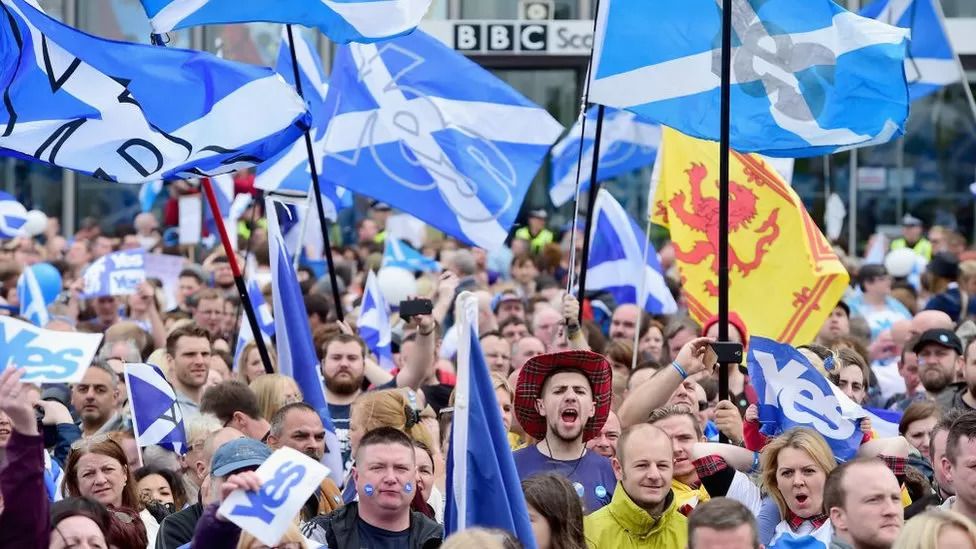
SNP plays longer game in bid for Scottish independence
In a rethink of strategy, Scotland's First Minister and new SNP leader Humza Yousaf wants to focus on making the case for independence because he knows pushing for a vote immediately will be rejected.
Mr Yousaf told the BBC this week that he wants a "consistent majority for independence".
Senior figures familiar with his thinking say there has been a shift in position since Nicola Sturgeon stood down - with Mr Yousaf wanting to prove independence is the settled will of Scottish voters.
They acknowledge Mr Yousaf has introduced an extra step in the process of forcing another referendum.
Ms Sturgeon had wanted to use the next general election in Scotland as a de facto referendum.
Mr Yousaf does not favour that policy but has said he will listen to SNP members about the next steps.
In opinion polls, support for Scottish independence consistently sits in the mid to high forties.
But senior figures acknowledge they have not yet moved the dial to show sustained support as a majority.
Sir John Curtice, professor of politics at Strathclyde University, told the BBC: "The realisation has dawned on them that while support for independence has tended to be higher than it was in 2014, it tends to be just below 50%.
"If you want to win a referendum - and clearly make the case a referendum is justified - you need to start well ahead."
In the independence referendum in 2014, Scotland voted against becoming an independent country by 55% to 45%.
Since becoming first minister, Mr Yousaf has demanded a Section 30 order - to allow another referendum.
But that has not been accepted by the prime minister.
Mr Yousaf's allies acknowledge the position in Westminster is not going to change under the current government. The Supreme Court also made clear last year that Holyrood could not force another vote without Westminster's consent.
Sources say they now have to move the dial to force another referendum - and that there is no shortcut to making that happen.
They argue events may help change that.
In particular, they claim a Labour government could be forced to accept another referendum as the price of support in a hung Parliament.
Labour has said it would not cut any deals with the SNP.
 Scotland voted against independence by 55% to 45% in 2014
Scotland voted against independence by 55% to 45% in 2014
Mr Yousaf's focus on the longer term aim comes as his party is confronted by multiple short term challenges.
There is the ongoing police investigation into the SNP.
Senior figures in the party expect Ms Sturgeon to be questioned by detectives soon.
Secondly, there are increasingly public tensions in the party, both at Westminster and Holyrood.
There is also the political challenge of Labour's revival in Scotland, and the potential threat Sir Keir Starmer's party poses to the SNP in the central belt and the west of Scotland.
Labour thinks it could win back as many as 20 seats in Scotland at the next general election.
Mr Yousaf is responding to this threat by portraying himself as the most left-leaning political leader in Scotland. He has talked about increasing taxes on higher earners to improve his "progressive" credentials.
Any strategy which involved waiting longer for an independence referendum would be a risk for the SNP leadership.
Some SNP politicians and activists want more immediate action.
Ms Sturgeon also faced criticism for relegating the importance of independence in the 2017 general election campaign - with some in her party arguing they failed to mobilise their key support and thus lost seats.










